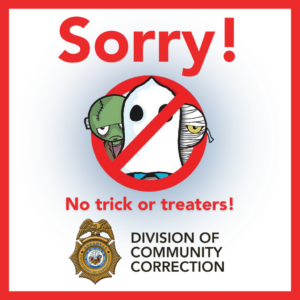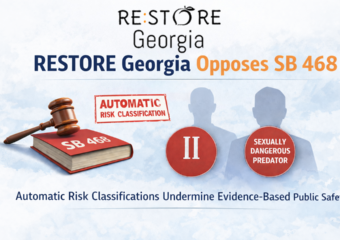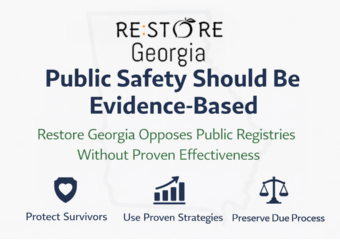FILTER MAG: Nothing Sums Up the Sex Offender Registry Quite Like Halloween
By C Dreams…
Since 2008, people on sex offender registries in Missouri have been required to post a sign at their home each year on October 31: No candy or treats at this residence.
In a ruling issued October 2, a federal judge found the signs unconstitutional because they’re a form of “compelled speech”—when the state forces you to express a viewpoint you don’t agree with. Judge John A. Ross noted two other courts to previously address similar Halloween signs, both of which found them unconstitutional for the same reason. California overturned the requirement in 2012. Georgia did so in 2022, a year before I paroled out from Georgia Department of Corrections custody to begin navigating life on the registry.
Missouri Attorney General Andrew Bailey has already vowed to challenge the recent ruling. But the rest of Missouri’s “Halloween Statute” remains legally in effect, including the curfew that basically anyone on a sex offender registry anywhere in the country faces. In Missouri, for example, it’s still a misdemeanor to go outside on Halloween after 5:30 pm.
On October 31, myself and registrants across the country will be essentially be placed on house arrest. You’re required to make it look like no one’s home, which means not being allowed to answer your door or turn your outdoor lights on—in Georgia, this includes indoor lights. Parole or probation officers may intermittently come by to make sure you’re still sitting at home alone with the lights off.
For many that’s the best-case scenario. In Georgia, depending on your county or your parole officer, you might be required on October 31 to report to a designated location like a convention center, where they corral you with all the other registrants until morning. Or you might be required to turn yourself into the county jail.

The Georgia case cited by Judge Ross, Cory McClendon v. Gary Long, began in October 2018 when the Butts County Sheriff’s Office placed yard signs at the address of everyone registered in that county. Registrants were forbidden from covering or removing the signs before officers came around on November 1 to collect them. It was not the only Georgia county to do this.
Previously, registrants had been given flyers they were instructed to post on their doors. Butts County Sheriff Gary Long decided that wasn’t enough. Yet there was no evidence that yard signs protected trick-or-treaters from being assaulted by people on the registry. Not because the signs failed to be effective, but because the threat did not exist.
“[Long] even admitted that, since he took office in 2013, he had never had an issue with a registrant having unauthorized contact or reoffending with a minor on Halloween or at any other time,” district court judges stated in the 2022 ruling. “The Sheriff has not provided any record evidence that the registrants in Butts County actually pose a danger to trick-or-treating children or that these signs would serve to prevent such danger.”
Sex offender registries have little to nothing to do with keeping the nation’s children safe. Despite the state propaganda that encourages the public to associate registries with a stereotype of violent pedophiles, many people including myself are automatically required to register based on convictions that didn’t involve sexual assault—of children or anyone else—at all. Children are more likely to be on a registry themselves than to be assaulted by someone on a registry.
Sheriff Long falsely claimed that “Georgia law forbids registered sex offenders from participating in Halloween, to include decorations on their property.”
In 2018, Sheriff Long had claimed that “Georgia law forbids registered sex offenders from participating in Halloween, to include decorations on their property.” The circuit judges in McClendon v. Long found it “undisputed” that that claim was false; there is no such law. But for some people on the registry, there might as well be.
If you’re on parole or probation in Georgia, then whatever the law might say, your life is governed by the Department of Community Supervision. Each year, the department instructs us to not decorate or otherwise participate in Halloween. I was even recently denied permission to attend an adult costume party that will take place a full week before Halloween.
I know someone on the registry who, while still on probation, was living with his mom, a practicing Celtic Wiccan. As a witch, Halloween is a sacred day for her and traditions like jack-o’-lanterns carry spiritual meaning, and she wasn’t allowed to participate in them even inside her own home.
In theory, a parole office could enact a policy mandating the “No Candy” signs and one of us would have to take it to court. Which many people on the registry, but particularly those still under supervision, would be terrified to do. Courts are often loathe to depart from precedent, and no one wants to bring legal challenges that would just make the situation worse.
Top image via United States Court of Appeals for the Eleventh Circuit. Inset image via Arkansas Department of Corrections.
Originally posted at Nothing Sums Up the Sex Offender Registry Quite Like Halloween

C Dreams
C is a writer and advocate interested in prison/criminal justice reform, LGBTQ rights, harm reduction and government/cultural criticism. She has studied history/theology with the Third Order of Carmelites and completed degrees in Systematic Theology. She is currently studying law.





